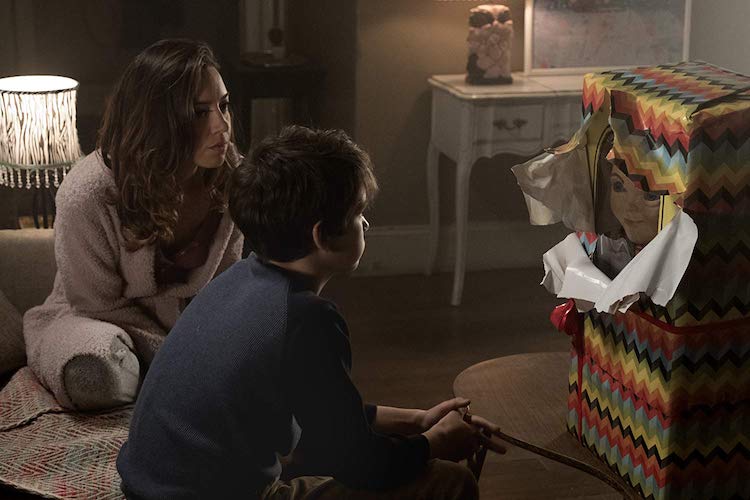There’s something different about Chucky in the new Child’s Play remake. Originally birthed as a very creepy-looking killer doll possessed by the spirit of a wise-cracking fugitive serial killer through some sort of very un-P.C. voodoo magic in the mean, lean 1988 film of the same name, the 2019 Chucky (voiced by Mark Hamill) is turbo-charged, fully CGI, and unfortunately wired all wrong, much like the silly new film that’s centered around it. Overstuffed with weak Black Mirror–style commentary about globalization and the SoCiEtY we live in, Child’s Play 2019 fails to justify its existence, even amid a pretty slow year for the genre thus far.
The 1988 film — written by Don Mancini, and directed as more of a grimy, darkly funny thriller by Tom Holland — centered largely around the adults trying to stop 6-year-old Tommy’s possessed Good Guys doll (voiced by Brad Dourif) from killing everything that comes into its path on the south side of Chicago as it seeks revenge on everyone who wronged him in life. It’s not prestige horror (a term I kind of groan to use), but it’s a serviceable B-movie, and you can’t deny its immense pop-culture impact. It’s also bolstered by strong performances from Chris Sarandon as the non-nonsense cop trying to put an end to the madness, and a pre–7th Heaven Catherine Hicks playing Andy’s widowed mother.
Forget all that, though: This glossy new version completely changes tone and reconfigures Chucky’s origin story and pretends that the various sequels never happened. This time around, the cop character (played by a very funny Bryan Tyree Henry) is given very little to do. Instead, the action is largely centered around Andy (Gabriel Bateman), who is 13 and thus old enough to be a bit embarrassed about being given a Buddi doll for his birthday. He’s lonely, however, having recently moved to a new neighborhood with his mom, Karen (a miscast Aubrey Plaza, who’s given very little to do here), so he ends up enjoying Chucky’s company, even as it begins to glitch out and engage in some pretty disturbing behavior. (The fact that he doesn’t take a baseball bat to it early on remains pretty baffling to this writer.)
As you might imagine, toy technology has come quite a long way since 1988 (although apparently CGI has not — the character design is pretty shoddy): Chucky is now able to sync up with and control various household devices thanks to creepy parent company Kaslan. In theory, the Buddi dolls are totally safe thanks to their programming, but this particular doll is on the fritz thanks to a disgruntled worker at its manufacturer’s warehouse in Vietnam. At first, the targets of this Chucky’s rage feel a bit understandable — Andy’s red-headed would-be stepfather (David Lewis) is an abusive jerk who clearly needs to go — but as the film goes on, he begins to go after people who in no way don’t deserve it. It’s particularly disturbing to watch Chucky attack Doreen (Carlease Burke), the sweet old lady who lives in Andy’s building who just wants to go play bingo with her friends.
One of the film’s biggest problems is its pacing. The running time (exactly 90 minutes) isn’t all that long — these days, I’m grateful to filmmakers who keep their projects under two hours — but the film goes off on so many derivative Goonies-aping tangents that you’d be forgiven for checking your watch about two-thirds of the way through. Director Lars Klevberg (see, the direction is uninspired enough that you sort of forget someone had to direct this) and screenwriter Tyler Burton Smith (who to this point seems to have primarily written for video games) have crammed so many extraneous characters (why did Jack Black accept this weird and forgettable cameo role?) and plot threads into the proceedings that it’s hard to care about anyone you see on screen, A.I. or otherwise.

